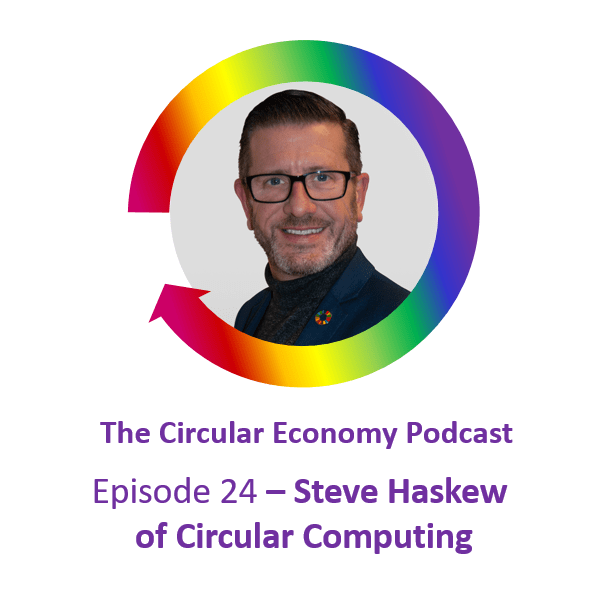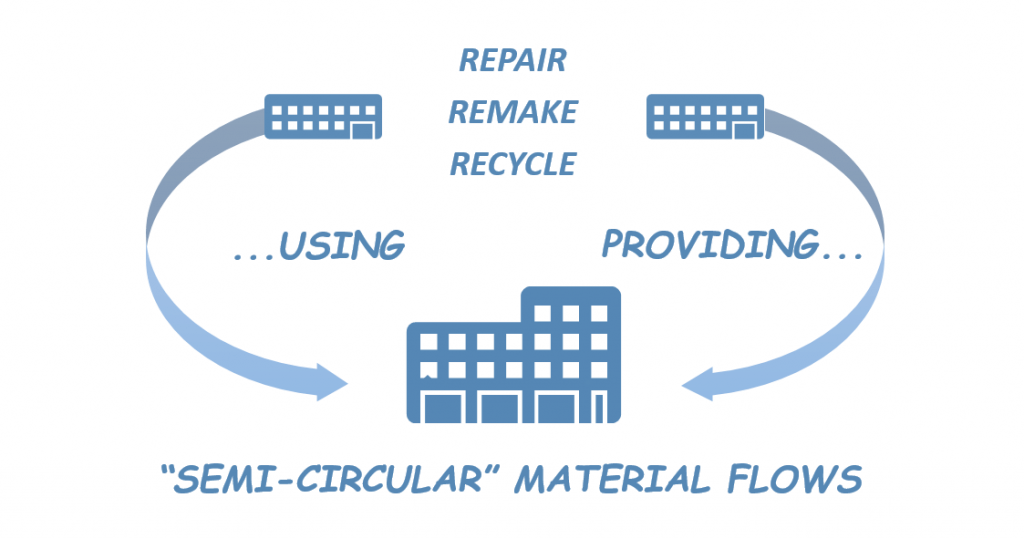Circular Computing | Semi-circular | A Just Transition | Earth Logic | Assumption reversal |
“When people are determined they can overcome anything” - Nelson Mandela
We help entrepreneurs, companies and business leaders discover and use the circular economy – to build profitable, resilient, sustainable and successful businesses. We believe in a circular economy that is fair, transparent and inclusive, to create a better world for everyone.
Welcome to the latest round-up of what we’ve shared, and what’s inspired us. In the UK, we’ve moved swiftly from ‘elbow bumps’, to a wave through a window. It already seems an age since I was in London in March, delivering a mainstage talk for UK Defence Strategic Support: ‘Rethinking Defence for a Circular Economy’.
There are some uplifting stories of communities managing to stay connected despite ‘social distancing’ – here are a few from the Guardian. I particularly liked the bit about the bears in Stockport…
In this issue:
- Episode 24 of the Circular Economy Podcast, with Steve Haskew of Circular Computing
- Blog: Why ‘semi-circular’ strategies are a sustainable step forward
- What we’ve been reading – ‘Promoting a Just Transition to a Circular Economy’
- Thank you letters
- Earth Logic
- Optimism and Outrage – our latest!
Did you receive this email from someone else? You need your own! Stay in touch for free circular economy insights and updates, direct to your Inbox.
Don’t want to hear from us any more? Just unsubscribe!
Episode 24 of the Circular Economy podcast, with Steve Haskew of Circular Computing
Remanufacturing is one of the circular economy strategies that helps us keep products, components and materials ‘in the system. It means we can have high-quality, reliable products and equipment with pretty much the same performance as a new version – and costing significantly less – for the customer, society and our environment.
In today’s episode, I’m talking to Steve Haskew of Circular Computing, which remanufactures high-quality top-brand laptops, including Dell, HP and Lenovo. They are certified carbon-neutral, with performance tested as providing 97 per cent compared to a new model.
Circular Computing has been remanufacturing since the 1990s, and provides laptops to education, public sector and even direct to consumers. Every machine goes through a 100+ point-check, any worn components are replaced and selected components are upgraded to give them a performance boost.
The company now has over 250 staff and remanufacturing capacity of up to 10,000 units each month. We talk about the customer value proposition, and how remanufacturing is different to second-use products.
Episode show notes and audioplayer here
Find the podcast series on iTunes, Google Podcasts, PlayerFM, Spotify, TuneIn, or search for “circular economy” in your favourite podcast app.
PS We’d love it if you could post a review, and help other people find us!
Blog: Why ‘semi-circular’ strategies are a sustainable step forward
You’re probably noticing the growing interest in the circular economy – but what on earth are ‘semi-circular’ strategies? We unpack what podcast guest Steve Haskew meant by ‘semi-circular’ and look at why semi-circular strategies are a sustainable step in the right direction. Read more
What we’ve been reading
The latest Chatham House research paper on the circular economy: Promoting a Just Transition to an Inclusive Circular Economy, points out that ‘many social and political issues social and political issues have so far been neglected in planning for the circular economy transition.’ The paper, by Patrick Schröder, notes that the ‘urgency to connect environmental with social justice is gaining in significance’ as we understand more about the links between the environmental impact of climate change, overconsumption and resources and waste generation, and the social issues of inequality and the future of work.
A ‘just transition’ will ensure environmental sustainability, decent work, social inclusion and poverty eradication. It will also reduce inequalities within and between countries, and fulfil the UN SDG goal to ‘leave no one behind’.
There is a risk that promoting circularity will cause worsening working conditions and health impacts. We already hear about the downsides of exporting waste . Often, there is unregulated waste processing, with landfill and illegal burning leading to health issues for humans and other living creatures, and poisons leaching into soil and water. Digital technologies and industrialization will also affect employment.
Circularity means recycling metals and minerals instead of mining new ones – this too may adversely affect many low- and middle-income countries that rely heavily on mining. Changes in agricultural practice may be difficult for smallholder farmers to adapt to. Manufacturing fast-moving consumer goods and textiles are also vital for those economies – a focus on reducing consumption and making products durable and repairable could also undermine these sectors.
The report concludes that the circular economy does have the ‘potential to foster a just transition, and to reduce existing tensions and struggles around resource conflicts and unequal distribution of resources.’ It sees the main benefits in ‘reducing the pollution burden on the poor and pre-empting negative impacts on employment.’
Peter Desmond first met Patrick Schröder when they were at the Institute of Development Studies at the University of Sussex. Peter co-wrote a chapter in The Circular Economy and the Global South: Sustainable Lifestyles and Green Industrial Development, edited by Patrick and published last year.
Peter, Patrick Schröder and Alexandre Lemille of Anthesis co-wrote a recent paper: ‘Making the Circular Economy Work for Human Development‘. The paper, published in the Science Direct journal Resources, Conservation & Recycling, ‘attempts to develop a framework that combines the circular economy and the human development approach. The aim is twofold: On the one hand, it aims to address the missing social dimensions of the circular economy agenda. On the other hand, it aims to include considerations of environmental sustainability in the human development approach.’
Thank you letters
Thanks to Guy Raithby-Veall for sharing an article from BBC Canada, on how to get creative by using ‘assumption reversal’. The article: Coronavirus: The good that can come out of an upside-down world, explores how we can use this technique to overturn our habitual assumptions.
Thanks also to all those people working in healthcare, the emergency services, social care, food and agriculture, logistics and public services – we appreciate all you’re doing to try and keep us safe and well.
Earth Logic
Thanks also go to Molshree Vaid, a writer for Ecotextile News, for inviting Catherine to comment on a new research paper/proposal by sustainable fashion scholars Kate Fletcher and Mathilda Tham: the Earth Logic Fashion Action Research Plan.
In the Guardian, Tamsin Blanchard’s article on the Earth Logic report reminds us that according to the UN, we have only 10 years to keep global warming to 1.5C. The article quotes Fletcher and Tham: “The time frame of 10 years is the same as a child’s time at school. One eighth of most people’s lifetime, or 10 annual reports for a business. Consider what you, your family, community, workplace will do in the coming 10 years. Every moment will count.”
Fletcher and Tham argue that we will only cut emissions, overproduction, pollution and waste if we imagine a whole new system. Recognising that business is a subset of society and the planet (not the other way round!), they propose “planet before industry as a radical idea in which the health and survival of our planet Earth is given precedence over business interests.”
Blanchard says influential trend forecaster Li Edelkoort has called Coronavirus a “quarantine on consumption”. The latest figures show the fashion industry to be producing 150 billion items per year – almost new 20 items of clothing/shoes for every person on the planet, every year. I’m sure many of us own clothing that we’ve kept for more than five years. A few decades ago, most clothing would last for much longer. Why don’t we get creative with our individuality, instead of believing all that marketing telling us we need to have the latest whatever (also bought by thousands of others!)
Fletcher and Tham are sceptical about the circular economy and its current direction, seeing it as ‘optimised to grow the circulation of materials’ and ignoring ecological realities and biophysical limits.
In my comments in the Ecotextile News article I agreed that the circular economy risks being hijacked to drive growth. I highlighted the risk of ‘rebound effect’, raised by Trevor Zink and Roland Geyer back in 2017, in Circular Economy Rebound in the Journal of Industrial Ecology. The Ecotextile News article is published in a special edition available for free download as a special gesture.
Recognising that corporates are pressured for constant growth by investors and shareholders, I asked whether we could change that by pushing for employee or cooperative ownership models. In addition, I asked how we could push for system-level policy drivers, such as taxing virgin resources and waste?”
You can download the Fletcher and Tham’s Earth Logic document here
Optimism and outrage
Inspired by the ‘Outrage and Optimism podcast‘ by Christiana Figueres (Executive Secretary of the UNFCCC 2010-2016), Tom Rivett-Carnac (ex UNFCCC and CDP) and their team at Global Optimism, we’re highlighting things we’re feeling optimistic about…
If you’re like us, you might be finding it difficult to stay optimistic right now, in the face of widespread hardship and uncertainty.
Companies, and individuals, are in the spotlight, with people looking at how they respond. Those helping support their communities (suppliers, staff, customers, local communities) are gaining fans. On the other side, there are those deciding to delay supplier payments, increase costs of in-demand products, or leave their partners to face the crisis alone. Here’s one example we’re outraged about. This story from Unherd draws attention to how Airbnb initially set out its stall, at the same time drawing attention to how the ‘renting economy’ can work against society and favour those with access to capital. It highlights that ‘circularity’ isn’t a panacea. Models like this help encourage rent-seeking and other exploitative practices, as well as potentially creating a rebound effect through cheaper tourist accommodation. However, Airbnb did react to the storm of criticism, as this article from the Guardian explains.
Let’s end on an upbeat note with some optimism.
Maybe now is the time to start dreaming of a better world, and getting clear on that would look like. We are (again) reminded that friends and family are more important than the latest tech or clothes. How can we get clear on the values and aims for humanity in the Anthropocene era? In The Children’s Fire, Mac Macartney relates the words spoken by Kogi Indians: ‘what is the purpose of human life? To care for all living things. What else?’
We’re big fans of economist Kate Raworth‘s work, stemming from her time at Oxfam. Kate is planning a series of blogs, exploring the coronavirus crisis through the lens of Doughnut Economics. Kate is asking for ideas – why not pitch in!
And, hot off the press, a circular economy innovation… Rheaply, a Chicago startup, and Northwestern University launched a free Emergency Resource Exchange (ERx) platform that allows Illinois organizations to share critical materials like masks and ventilators during COVID-19. Applause for Rheaply!
What can we all do, in work and in life, to help regenerate our planet, and create healthy, thriving and abundant ecosystems for ALL living things?
Hope you have a good week…


